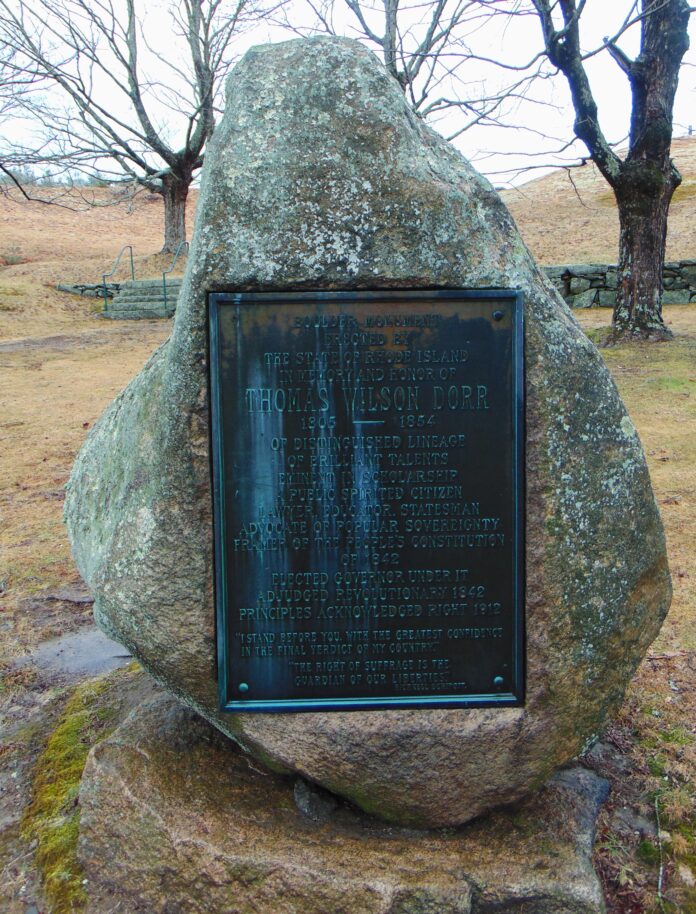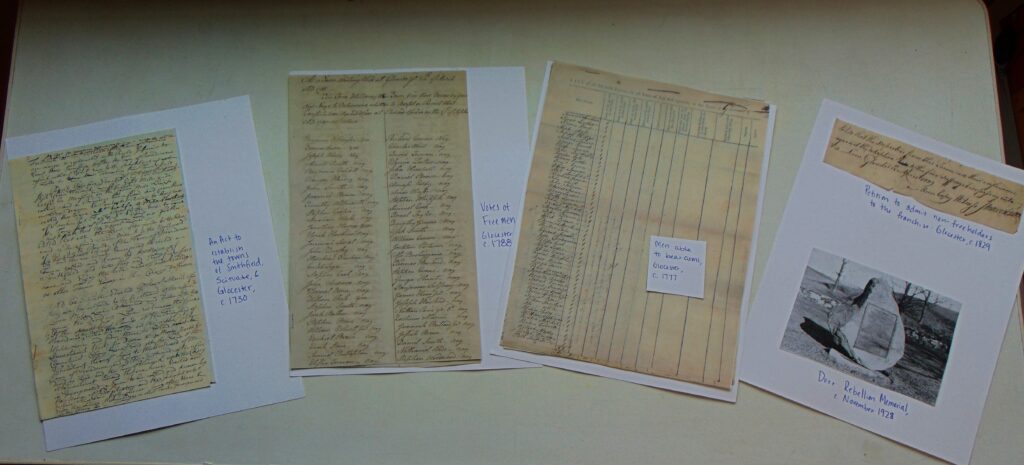
GLOCESTER – Plans are gearing up for Rhode Island’s celebration of the 250th anniversary of the signing of the U.S. Declaration of Independence in 2026, and Glocester is planning on being an important part of it.
Three council members, Walter Steere, Jonathan Burlingame and Stephen Arnold, come from families rooted in Glocester and Rhode Island history, as pointed out by Rob Rock, Rhode Island’s deputy Secretary of State.
Rock recently addressed the Town Council, explaining that the state’s 250th Anniversary Commission wants the upcoming celebrations to be just as grand as what took place in 1976 for the 200th anniversary.
“We want to make 2026 something similar,” he told the council.

Rock gave the town several replicas of early documents signed by Glocester residents, including an act to establish the towns of Smithfield, Scituate and Glocester c.1730, a list of votes by the freemen of Glocester, c.1788, a list of men able to bear arms from age 16 to 50 c.1777, and a petition to admit non-freeholders to the franchise: Glocester, c.1829.
“Many of your relatives, I guess, would be on here,” Rock told the council. “Steeres, Burlingames, Arnolds are on this list.”
It was a good guess. Current town councilors include Walter M.O. Steere III, Jonathan E. Burlingame and Stephen W. Arnold. Steere’s father, Walter M.O. Steere Jr., is a former school committee member, while Burlingame’s father, Edward “Ted” Burlingame, is a former town council president. But there is much more to that.
“The Steeres go way back,” Walter M.O. Steere Jr. later told NRI NOW. “My great, great grandfather had a farm out here. They owned a lot of land out here at one time. There are so many names you come across all the time: Hopkins, Winsors, Burlingames. The history is very well documented.”
The Burlingames are the same. Edward Burlingame explained that the family name goes back to the early 1600s in the state, including one Roger Burlingame, who at one time was a minister for the First Baptist Church in Providence.
“There were two Burlingames who were the first officers of the Friendship Lodge, which was established in the early 1800s,” said Ted Burlingame. “Burlingame Pond in West Glocester was where a mill was located back then. There is a very old Burlingame Cemetery near there also.”
Early Burlingame homesteads existed on Cranberry Ridge Road and other locations in town as well.
Though the Arnolds were not early settlers in Glocester, their name is well represented throughout the Ocean State, including Lincoln, where the Ezekiel Arnold homestead is now a museum open to the public. Arnold explained that, yes, in fact, that was an early distant relative.
“Yes, Ezekiel Arnold is my ancestor,” said Arnold. “Another one of my relatives was one of the 13 people to sign the document with Roger Williams to incorporate the City of Providence back in the day; so, family history runs deep, and that is, in fact, my Arnold wing, so to speak. It’s pretty interesting stuff.”
That original signer, whose name appears on several documents in the early 1600s, was William Arnold. According to the website, “Colonial America-The Arnold family of New England,” William Arnold owned land in Pawtucket, and served as president of Portsmouth, Providence, Newport and Warwick, before moving on to become governor of the Colony of Rhode Island for 10 years. His son, Stephen Arnold (1622-1699) was deputy governor of Rhode Island in 1664.
The commission is hoping that historical connections and recognition of various towns’ contributions like those come alive again, Rock said. The General Assembly created the group in 2021, charged with focusing on anything related to the American Revolution, spurring economic development and civic engagement. One of the tasks of that commission is to visit all 39 cities and towns and see if they will be willing to join in the celebration, both individually and collectively. That participation looks different in each case, with some overlaps, as well.
Glocester’s visit was number 34 out of the 39. All, so far, have agreed to participate, Rock said.
Some towns are creating their own committees, while some are using existing committees and charging them with the task moving forward of creating and organizing events to honor the anniversary. Some are asking their historical societies to take the lead, he added.
“Rhode Island certainly has led the way in the American Revolution, being one of the first 13 colonies,” said Rock. “Everyone talks about the Boston Tea Party starting the American Revolution. It was really the Gaspee in Pawtucket that started the American Revolution. So, the rich history that Rhode Island has – and Glocester has with the Dorr Rebellion… it’s really important we get involved.”
Rhode Island Secretary of State Gregg Amore, he said, was a history teacher for 30 years and, “loves this stuff.”

“We can help in any way we can, help start your group and supplement any events you have in the next couple of years,” said Rock. “One of the cool things about our office is that we oversee the state archives. We’ve got some really cool documents.”
Those include an original copy of the Declaration of Independence only signed by John Hancock, the Act of Renunciation, and the Royal Charter. Among that collection, said Rock, are a number of documents and artifacts from individual towns in the state. Should the town have a special celebration, those documents and artifacts could be made available for that celebration for people to see firsthand.
“We will definitely get involved,” said Town Council President William Worthy.
To what extent that involvement will be is uncertain at this point. Also up for consideration is whether or not to create a new commission or utilize an existing commission. Vice President Arnold suggested taking a look at other town’s involvement and what they are planning in order to get a better idea of what people are doing and the best way is to proceed. Worthy asked if towns are planning on joining a state celebration or having their own individual celebrations or both.

“They’re taking different approaches,” said Rock. “Each town has its own rich history; so, they’re trying to create something in the town, but also supplement what we’re trying to do at the state level.”
Part of the state’s plan is to try to bring in the Tall Ships. Additionally, the state is planning on giving each town a tree to plant in a town center or green, and a plaque honoring the 250th anniversary.
“There are towns that are going to create special events and run with them, and we are happy to support them any way we can,” added Rock.
He added that the, “team,” in Glocester is, “top notch,” including Town Clerk Jean Fecteau and her office.
“I have worked with Jean for all of my time in state government, and she is absolutely tremendous, along with Chris (Mathieu), Sue (Cole), and Dorothy (Gendron), and, before that, Liz Randall, a tremendous team you have in Glocester,” said Rock. “Oftentimes, government employees go unnoticed and unacknowledged, but I want to let you know it is a pleasure working with the town.”
The council agreed to place the commission for consideration on the agenda for the next town council meeting on Thursday, Feb. 1.







My Cousin Ted’s comment about Roger Burlingame being a pastor of Roger Williams’s First Baptist Church is just slightly off. While Roger was the first Burlingame to show up in RI, it was Roger’s son, Rev. Thomas Burlingame, who was the 10th pastor of the church in the mid-1700’s
The “Burning of the Gaspee” took place off the shores of Pawtuxet, Warwick.